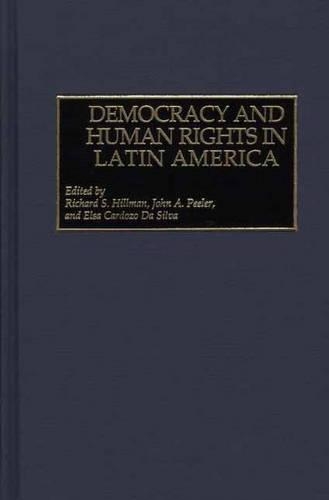
Democracy and Human Rights in Latin America
(Hardback)
Publishing Details
Democracy and Human Rights in Latin America
By (Author) Richard S. Hillman
Edited by John A. Peeler
Edited by Elsa Cardozo Da Silva
Bloomsbury Publishing PLC
Praeger Publishers Inc
30th November 2001
United States
Classifications
Tertiary Education
Non Fiction
Human rights, civil rights
Regional / International studies
321.8098
Physical Properties
Hardback
240
Description
The complexity of democratic transitions in Latin America and the importance of how human rights and democracy are linked is evaluated by top scholars. Questions about democracy and human rights have emerged in the advent of the 21st century, a time in which the prospects for progress in these areas have never been greater. This book is designed to respond to some of these questions with reference to Latin America, where democratic regimes have alternated with authoritarian governments and the human rights record is inconsistent at best. Taken together, these essays reveal the complexity of democratic transitions, the importance of support for human rights, and the way in which democracy and human rights are linked in Latin America. The first part of the book includes chapters that cast a critical eye on democracy and human rights trends in Chile, Venezuela, Columbia, and Brazil. Part two gauges the impact and prospects of foreign initiatives promoting democracy and human rights in the region, focusing especially on those efforts made by the United States in Haiti and Cuba. Each chapter reaffirms the essential linkages between procedural democracy and substantive human rights, and argues that states with authoritarian pasts must reorient their political cultures, and that these initiatives must come from both domestic and international agents. Students and scholars interested in the problems and prospects inherent in democratic transitions in contemporary Latin America will find this collection enlightening.
Reviews
This important work examines the obstacles confronting Latin American countries in pursuing the goals of democracy and human rights, with a focus on Chile, Venezuela, Colombia, Brazil, Haiti, Cuba, and US policy toward Latin America. The writers in this edited collection note that the military is no longer the main threat to democratic government, replaced today by weak economies, corruption, crime, voter apathy, and the ever-widening gap between the rich and poor. When the masses see democratic government as a facade for rule by a privileged elite, they are ready to accept autocratic leaders who appear capable of solving socioeconomic problems. In their focus on US policy toward Latin America and the collective security apparatus of the Organization of American States, the writers--who are collectively committed to the promotion of democracy and human rights--bemoan the timidness in addressing the undermining of democracy and human rights under democratically elected governments. In the unique example of Cuba and the Castro regime, the suggestion is to end the US trade embargo and to convince private business to attach human rights conditions to investment in Cuba. Recommended for upper-division undergraduates and above.-CHOICE
"This important work examines the obstacles confronting Latin American countries in pursuing the goals of democracy and human rights, with a focus on Chile, Venezuela, Colombia, Brazil, Haiti, Cuba, and US policy toward Latin America. The writers in this edited collection note that the military is no longer the main threat to democratic government, replaced today by weak economies, corruption, crime, voter apathy, and the ever-widening gap between the rich and poor. When the masses see democratic government as a facade for rule by a privileged elite, they are ready to accept autocratic leaders who appear capable of solving socioeconomic problems. In their focus on US policy toward Latin America and the collective security apparatus of the Organization of American States, the writers--who are collectively committed to the promotion of democracy and human rights--bemoan the timidness in addressing the undermining of democracy and human rights under democratically elected governments. In the unique example of Cuba and the Castro regime, the suggestion is to end the US trade embargo and to convince private business to attach human rights conditions to investment in Cuba. Recommended for upper-division undergraduates and above."-CHOICE
Author Bio
RICHARD S. HILLMAN is Professor and Director, Institute for the Study of Democracy and Human Rights, at St. John Fisher College and Central Bucknellty of Venezuela. JOHN A. PEELER is Presidential Professor of Political Science at Bucknell University, Lewisburg, PA. ELSA CARDOZO DA SILVA is Professor, School of International Studies, at Universidad Central de Venezuela, Caracas.
